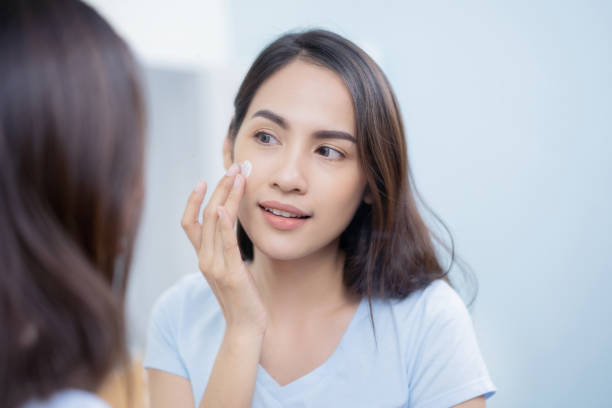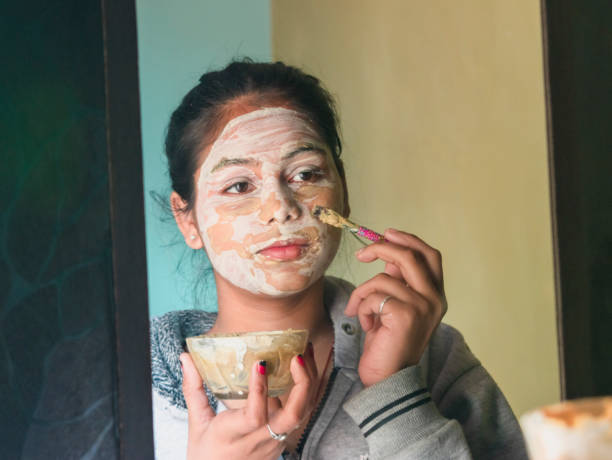To proper care of your skin, it is imperative to know the type of your skin and what kind of care needs
The healthy, glowing skin is not the exclusive privilege of those who can afford professional skin care. Developing a routine of keeping your skin clean, hydrated and protected can help you look your best. A good daily skin care should not take more than 10 minutes a day.
The following steps should be incorporated into your daily skin-care routine that will help your skin looking and feeling healthy, clear and youthful:
DETERMINE YOUR SKIN TYPE
Before you can find the right stuff to put on your skin, you must first determine its type. To do so, look at your bare face in a mirror in natural daylight (i.e. outside or near a window.)
Contrary to that dry skin feels tight and dehydrated. It may also look flaky, red and rough.
Oily skin is shiny, especially along the T-zone, where oil glands are most prevalent and tend to breakout. Large pores may also indicate oiliness.
Normal skin has a uniform texture and tone while combination skin has oily and dry patches. It may be shiny/blemished along the T-zone and scaly around the periphery. Finally, there is sensitive skin which needs more care.
DRY SKIN
Dry skin occurs when the dermis does not secret enough oil or sebum.
How to take care of it?
Wash your face once a day with rich, creamy cleanser and warm water. Rinse with cold water and pat your skin dry. Use oil-based moisturizers and make-up. Avoid toners and make-up that contain alcohol as alcohol based products have bad effect on this type of skin.
Certain ingredients that should be looked for any treatment cream for this skin type, as dry skin is prone to flakes, itches, etc.
Wheat Germ Oil: it is high in vitamin E and acts as anti-oxidant.
Aloe vera: it is famous fr its moisturizing and soothing properties as well as for its ability to aid in healing.
Sandalwood: moisturizes dry skin
Almond oil: A versatile, carrier oil, good for all skin types. It helps replenish the oils lost from the skin during the cleaning process.
Calendula flower: It is anti inflammatory and is often used to treat itching, flaking and drying of the skin.
Chamomile: It reduces irritation due to dryness of skin.
Bees wax: It helps retain moisture.
Cocoa butter: It often protects chapped skin, relieves irritation and diminishes signs of wrinkles and stretch marks.
Glycerine: It relieves irritation and moisturizes the skin.
OILY SKIN
Oily skin is more prone to pimples, black heads white heads than other skin types and is coarser in texture. However, now creams are available as per skin types which not only prevent pimples from occurring but not take care of pimple marks by diminishing and clearing them gradually.
How to take care of it: oily skin tends to attract more dirt than dry skin, so wash your face several times a day with a light, non greasy liquid soap and warm water. Rinse with cold water. Use of face back once or twice a week absorbs excess oil. Use toners and astringents containing alcohol to help dry the skin. Buy water-based moisturizers and make-up and use powder to minimize shine.
Remember to look for the following variants in your cream.
Neem: It acts as astringent for the skin.
Tulsi: it has cooling effect on the skin.
Chandan: It absorbs excess oil giving a glow to the skin.
Alpha Hydroxy acids: Natural plant extracts that improves the look and condition of the skin.
Astringent: It is effective on oily and blemished complexions. Performs tightening action on the skin and pores.
Turmeric: It has antiseptic qualities and also lightens the darker skin.
Lime: Treats acne as it is astringent, antiseptic and non- irritating.
Camphor: It is a cooling and highly stimulating herb. Used for oily skin and acne.
Lavender: It is an all-skin care product that promotes healing and prevents scarring, used on itchy skin, bruises, burns and blemishes.
COMBINATION SKIN: NORMAL TO OILY
People with this skin type have normal skin on their cheeks and oily skin with enlarged pores on their T Zone that stretches across the forehead and down the nose and chin.
HOW TO TAKE CARE OF IT:
For this skin type of skin it is necessary to find products that will keep your skin hydrated, while minimizing breakouts. Look for cleaners designed for combination skin and use water based moisturizer, applying it less frequently.
COMBINATION SKIN DRY TO OILY
This skin type is marked by oily skin in the T zone and dry, taut skin on the cheeks.
How to take care of it? Wash your face with cleansers that are designed for combination skin and when using a toner, dilute it with water before applying on your cheeks. Apply moisturizer more frequently to dry skin. Use oil absorbing make-up to reduce shine.
Combination could use a mix of ingredients of dry skin and oily skin.
SENSITIVE SKIN
This type irritates easily and is often red and blotchy. This type of skin can have allergic reactions to beauty products usually sensitive to the sun, wind and cold weather.
HOW TO TAKE CARE OF IT:
Look for soap, make-up and moisturizers that are fragrance free and hypoallergenic. Wash your face once a day and use skin exfoliants.
Use a hypoallergenic toner on oily areas, but discontinue if it causes irritation.
Ingredients like glycerine, jajoba, buttermilk, laender, tulsi, etc should be used which can moisturize the skin gently.
OTHER PRECAUTIONS
o Besides, you also need to consider your diet and lifestyle, since these 2 factors play an important role in the health of a persons skin
o Those 8 glasses of water a day your mom always told you to drink are essential to maintain your skin’s elasticity and suppleness.
o And don’t count coffee or any of the caffeinated soda as part of the 8 glasses because caffeine is dehydrating.
o You need to give some thought and consideration to the type of make-up you use. And be sure to clean your tools regularly. Things such as cosmetic brushes get dirty and can bacteria and germs and may cause skin irritations and breaking out.
o Keep environmental pollutants from being absorbed into the skin with a good moisturizer that also acts as a skin barrier, as they may cause marks and wrinkles.
o Get serious about stress reduction, as this may lead to conditions like acne, dark circles, marks, pigmentation, and etc. Set aside quiet time to meditate and be sure to get enough sleep.




